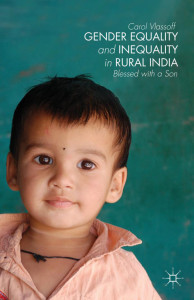This book focuses on son preference in rural India from an in-depth perspective spanning three study periods (1975-76, 1987 and 2007-08). It examines to what extent economic development has resulted in positive changes in women’s empowerment. This question is highly relevant today as India strives to improve overall social and economic conditions and gender relations through policies such as abolishing dowry, increasing the legal age at marriage and promoting educational opportunities for girls. Yet India is falling behind on key commitments, including the Millennium Development Goal targets, and ranked 105th out of 135 countries in the gender equality indicators cited in the Global Gender Gap Report of the 2012 World Economic Forum.
This study took place in a village in rural Maharashtra where impressive gains in economic development had occurred in recent decades, including the transformation of agriculture from subsistence to cash crops. Its favorable economic environment, coupled with progressive public policies, made this community an appropriate setting to examine how the traditional preference for sons was affected by these positive influences.
Its most important finding is that gender equality has lagged behind other areas of development due to the many economic, social and cultural constraints that make the presence of at least one son an overriding concern for rural families.
This book contributes new insights on the importance of rural women’s economic empowerment in influencing son preference and other aspects of reproductive behavior. It provides evidence of the added value of their employment beyond the traditional wage labour and domestic spheres, and argues that policies aimed at closing gender gaps in social inequalities must be complemented by policies fostering employment opportunities for women.
The absence of females at higher levels of India’s workforce is increasingly lamented in the media, mainly for economic reasons. However, this study goes further than economic arguments by demonstrating that women’s education and their professional labor force participation contribute to better health and well-being of rural society, including through reductions in fertility, son preference and infant and child mortality.


















